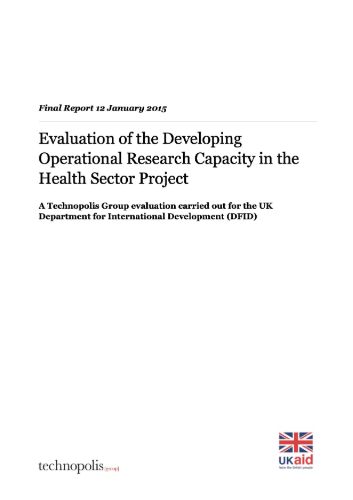Evaluation of the Developing Operational Research Capacity in the Health Sector Project
Publication date: 12 Januar 2015 | Report language: EN
Low and middle-income countries remain overburdened with infectious diseases such as TB, Malaria, and HIV/AIDS. Operational Research (OR) aims to provide robust evidence to policy makers in an effort to influence actions and improve public health and health service delivery in effected countries. Unfortunately, there are very few front line health practitioners that are trained in OR in low income countries. The UK Department for International Development (DFID) has funded the International Union Against TB and Lung Disease (The Union) to expand its capacity building programme in OR.
DFID commissioned Technopolis Group to conduct an independent, in-depth evaluation of The Union’s programme to assess its overall performance and effectiveness during the period October 2011 to August 2014. The results of the evaluation were intended to provide valuable lessons not only for DFID and The Union, but also for the broader research and development community, funders, and public health policy makers about The Union’s OR capacity building model.
The evaluation was conducted by a multidisciplinary team of social scientists, economists, and thematic experts in health and education. Extensive data were collected and analysed through reviewing operational and financial documents, available monitoring data, educational material, research publication outputs, and broad consultation with internal stakeholders as well as course participants and non-participants. The study also involved benchmarking The Union’s programme with other comparable OR initiatives.
The evaluation has found evidence that trained course participants increased not only their knowledge of OR concepts, but also their skills in supervising research team members, collecting safe and ethical data, implementing study design and effectively disseminating research results. There were a number of positive spill-over effects of the programme including course participants engagement in sharing their acquired OR knowledge and participating in research projects outside their organisation. OR skills appear to be appreciated and increasingly required by institutions and non- profit organisations, contributing to not only boosting participants’ careers, but also institutionalising OR. There have been a number of notable examples where changes took place in policy and practice following publication of OR project results. The evaluation also provided practical recommendations to improve specific aspects of the programme as well as more forward looking generalizable options for the broader community.
The findings of the evaluation have been beneficial to The Union in redesigning the next five years of their work to improve selection processes, introduce new courses to fit new stakeholders, and enhance the programme’s relevance by a stronger regional and country focus.
For more information, follow the links below:







